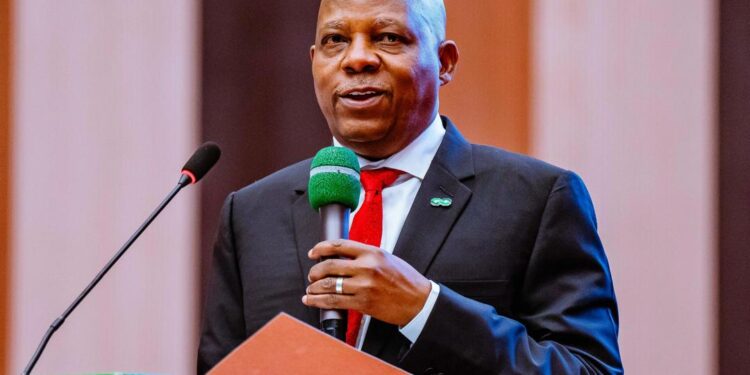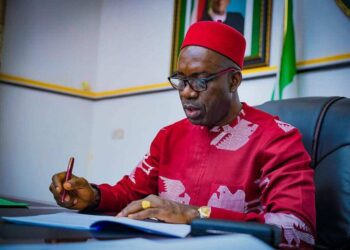Vice President Kashim Shettima has announced that the Tinubu administration is committed to moving Nigeria from cocoa production to processing as part of efforts to revive the country’s agricultural sector.
The announcement came during a meeting with a delegation from the World Cocoa Foundation at the Presidential Villa on Monday, according to a press statement issued by Stanley Nkwocha, Senior Special Assistant to The President on Media & Communications in the Office of The Vice President.
According to Shettima, the Federal Executive Council recently approved the establishment of a National Cocoa Management Board aimed at revitalizing the cocoa industry and the entire cocoa value chain. “Let’s walk the talk. We used to be one of the world’s leading cocoa producers, but because of the advent of oil, we have been relegated to the background now. But we can reclaim that lost glory, and the President is fully committed to revitalising not only the cocoa industry but all agricultural value chains,” the Vice President stated.
The Vice President explained the economic rationale behind the shift to processing, noting significant price differentials in the global market. “We don’t want to be producers of cocoa; we want to be processors of cocoa because a tonne of cocoa will fetch you $9,000 now, but processed cocoa will get you $30,000. If you turn them into chocolate bars, that might fetch you $50,000,” Shettima said.
He emphasized Nigeria’s demographic advantage in implementing this strategy, pointing out that the average age of the nation is 17. “We have very virile young men who are willing to work if they have the opportunity. So, I’m speaking from the heart; we are willing to partner with your organisation,” he told the World Cocoa Foundation delegation.
Shettima disclosed that he is already working on building a cocoa farm to lead by example, stating that his motivation is not profit-driven but focused on social welfare and job creation. “I want to walk the talk. It is not even about the profit criteria; no. It’s about the social welfare criteria – employing people,” he said.
The Vice President pledged Nigeria’s readiness to work with the World Cocoa Foundation and assured that he would personally engage the governor of Taraba State to secure 10,000 hectares in Kurmi local government area for the foundation and other partners to expand their investments in Nigeria’s cocoa industry.
World Cocoa Foundation President Chris Vincent expressed the organization’s readiness to work with the Nigerian government to revitalize the cocoa sector in line with European Union sustainable regulations. “We are in the middle of a global cocoa supply shortage, and the prices have risen four times over the last three years. We are looking for new supplies of cocoa, sustainable cocoa in particular,” Vincent stated. He noted that the foundation represents the global cocoa supply chain, including major chocolate and cocoa manufacturers.
Vincent identified the current period as presenting significant opportunities, saying, “The key thing here is that we have a clear alignment with industries which need to grow in supply sustainably, and I’m aware of the Nigerian State’s ambition to grow cocoa as a crop, and I know the opportunity is now. Because we are in a supply deficit, the next two to three years are an opportunity for growth.”
Meanwhile, Nigeria is actively pursuing a $25 billion undersea gas pipeline project to supply gas to Europe. During a separate meeting with Vitol Group, the world’s largest independent commodity trader, Vice President Shettima said President Tinubu’s economic reforms have positioned Nigeria as a prime investment destination, particularly in the energy sector.
“Most importantly is the leadership. President Bola Ahmed Tinubu grew up in that ecosystem- energy and finance. In the past 25 years, we have not had a leader who has the courage to take far-reaching decisions as he has taken- the removal of fuel subsidy, the unification of the multiple exchange rates, and the tax reforms,” Shettima stated.
The Vice President made a direct appeal to global investors, saying the President “is putting Nigeria on a new trajectory. This is where the action is, invest in Nigeria.” He described Nigeria’s gas sector as offering stability and transparency amid global uncertainty, noting that “the world is changing, and ours is actually a gas and not an oil economy. We have the eighth largest gas reserve in the world.”
Shettima highlighted the performance of Nigeria Liquefied Natural Gas Limited as an example of the sector’s potential. “The Nigeria Liquefied Natural Gas Limited (NLNG) has been largely insulated from government interference. What we are getting from the NLNG is so predictable. We really want to harness the potential in the gas sector fundamentally because of the stability and transparency in that arena,” he said.
Vitol Group’s Chief Financial Officer Jeffrey Dellapina affirmed the company’s long-term commitment to Nigeria, stating, “This has been an incredibly close and important country for Vitol for a very long time. We have participated in a lot of things from the downstream, financing, trading and government support when needed.” He added that Vitol is committed to the country and ready to deploy capital when needed.
Vitol Group’s Head of Public Affairs, Murtala Baloni, noted the company’s current favorable business relationship with Nigerian companies and the government. He cited the company’s $300 million contribution to Project Gazelle, a crude oil-backed forward-sale finance facility by the Nigerian National Petroleum Company Limited during the COVID-19 period, as evidence of their commitment to supporting government business initiatives.




















